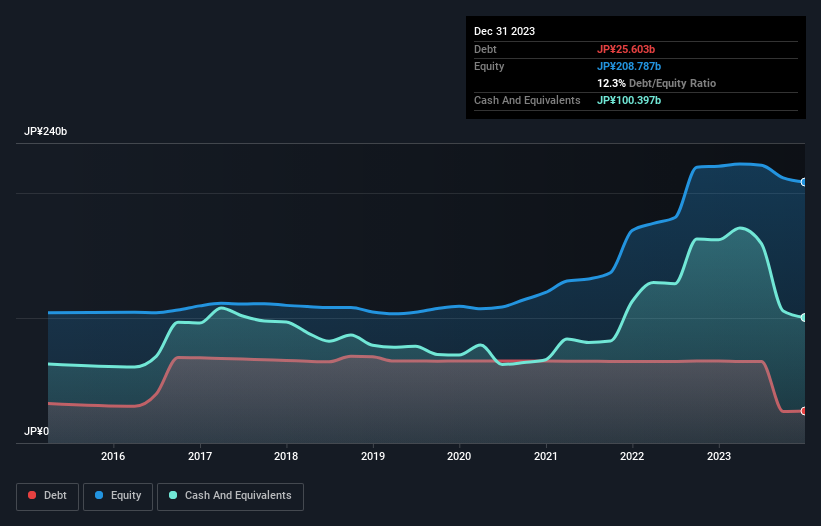These 4 Measures Indicate That Kadokawa (TSE:9468) Is Using Debt Reasonably Well
David Iben put it well when he said, 'Volatility is not a risk we care about. What we care about is avoiding the permanent loss of capital.' When we think about how risky a company is, we always like to look at its use of debt, since debt overload can lead to ruin. Importantly, Kadokawa Corporation (TSE:9468) does carry debt. But the real question is whether this debt is making the company risky.
Why Does Debt Bring Risk?
Generally speaking, debt only becomes a real problem when a company can't easily pay it off, either by raising capital or with its own cash flow. Ultimately, if the company can't fulfill its legal obligations to repay debt, shareholders could walk away with nothing. However, a more common (but still painful) scenario is that it has to raise new equity capital at a low price, thus permanently diluting shareholders. Having said that, the most common situation is where a company manages its debt reasonably well - and to its own advantage. The first thing to do when considering how much debt a business uses is to look at its cash and debt together.
View our latest analysis for Kadokawa
How Much Debt Does Kadokawa Carry?
You can click the graphic below for the historical numbers, but it shows that Kadokawa had JP¥25.6b of debt in December 2023, down from JP¥65.6b, one year before. But on the other hand it also has JP¥100.4b in cash, leading to a JP¥74.8b net cash position.

How Healthy Is Kadokawa's Balance Sheet?
We can see from the most recent balance sheet that Kadokawa had liabilities of JP¥86.4b falling due within a year, and liabilities of JP¥31.0b due beyond that. Offsetting these obligations, it had cash of JP¥100.4b as well as receivables valued at JP¥56.4b due within 12 months. So it can boast JP¥39.4b more liquid assets than total liabilities.
This surplus suggests that Kadokawa has a conservative balance sheet, and could probably eliminate its debt without much difficulty. Simply put, the fact that Kadokawa has more cash than debt is arguably a good indication that it can manage its debt safely.
It is just as well that Kadokawa's load is not too heavy, because its EBIT was down 21% over the last year. When it comes to paying off debt, falling earnings are no more useful than sugary sodas are for your health. There's no doubt that we learn most about debt from the balance sheet. But ultimately the future profitability of the business will decide if Kadokawa can strengthen its balance sheet over time. So if you want to see what the professionals think, you might find this free report on analyst profit forecasts to be interesting.
Finally, a business needs free cash flow to pay off debt; accounting profits just don't cut it. Kadokawa may have net cash on the balance sheet, but it is still interesting to look at how well the business converts its earnings before interest and tax (EBIT) to free cash flow, because that will influence both its need for, and its capacity to manage debt. In the last three years, Kadokawa's free cash flow amounted to 45% of its EBIT, less than we'd expect. That weak cash conversion makes it more difficult to handle indebtedness.
Summing Up
While it is always sensible to investigate a company's debt, in this case Kadokawa has JP¥74.8b in net cash and a decent-looking balance sheet. So we don't have any problem with Kadokawa's use of debt. When analysing debt levels, the balance sheet is the obvious place to start. However, not all investment risk resides within the balance sheet - far from it. These risks can be hard to spot. Every company has them, and we've spotted 2 warning signs for Kadokawa you should know about.
When all is said and done, sometimes its easier to focus on companies that don't even need debt. Readers can access a list of growth stocks with zero net debt 100% free, right now.
Valuation is complex, but we're here to simplify it.
Discover if Kadokawa might be undervalued or overvalued with our detailed analysis, featuring fair value estimates, potential risks, dividends, insider trades, and its financial condition.
Access Free AnalysisHave feedback on this article? Concerned about the content? Get in touch with us directly. Alternatively, email editorial-team (at) simplywallst.com.
This article by Simply Wall St is general in nature. We provide commentary based on historical data and analyst forecasts only using an unbiased methodology and our articles are not intended to be financial advice. It does not constitute a recommendation to buy or sell any stock, and does not take account of your objectives, or your financial situation. We aim to bring you long-term focused analysis driven by fundamental data. Note that our analysis may not factor in the latest price-sensitive company announcements or qualitative material. Simply Wall St has no position in any stocks mentioned.
About TSE:9468
Flawless balance sheet with reasonable growth potential.
Market Insights
Community Narratives



